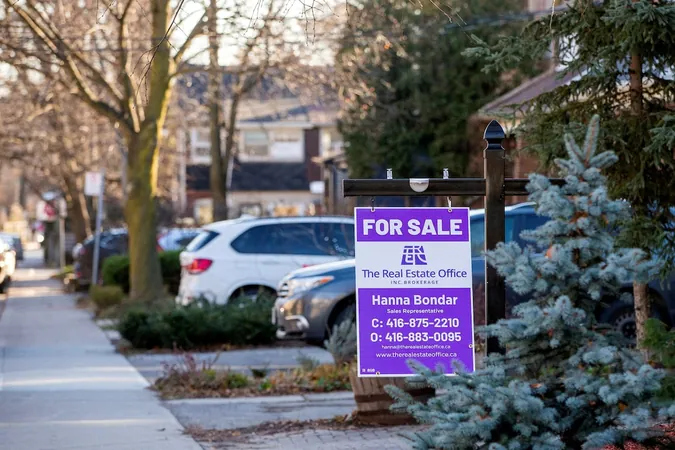
Toronto's Housing Market in Crisis: Distressed Sales Reach Alarming Levels!
2025-09-19
Author: William
The Greater Toronto Area (GTA) is experiencing housing market turmoil like never before, with a significant shift from boom to distress.
In August, average home prices in the GTA plummeted to levels not seen since February 2021. Simultaneously, housing inventory has skyrocketed to near record highs as the three-month moving average of the unemployment rate surged to 9.9%.
One of the most striking factors contributing to this downturn is the surge in distressed sales. Currently, 3% of homes for sale in Toronto fall under power of sale listings, indicating a wave of financially burdened homeowners.
This scenario compels us to scrutinize the state of non-performing mortgages—those behind on payments for 90 days or more. While only RBC, one of Canada's Big Six banks, offers region-specific data for non-performing mortgages in the GTA, it paints a concerning picture.
It's crucial to note that the actual number of troubled mortgages is likely higher; RBC tends to lend more conservatively, primarily to prime borrowers, pushing those with more complex financial situations to seek alternative lenders.
Data shows that between Q1 2017 and Q2 2023, the average share of non-performing mortgages in the GTA was a mere 0.06%. Today, that number has skyrocketed to approximately 0.42%, a staggering seven-fold increase in just a few years.
For context, the Greater Vancouver Area (GVA) sits at 0.27%, while the national average is around 0.31%. This rapid rise highlights the escalating financial strain on GTA homeowners, exacerbated by climbing borrowing costs, rising unemployment rates, and a decline in property values.
Historically, from January 1996 to September 2021, over 90% of homebuyers in the GTA saw their property values increase within a year, providing a valuable cushion during tough times through refinancing options.
Sadly, many recent buyers lack this safety net. With home prices now back to early 2021 levels, many have not accumulated the equity needed to buffer against financial setbacks.
Recent reports from BMO reveal that two-thirds of homeowners renewing their mortgages are facing payment hikes, even after the Bank of Canada's recent rate cut. Most renewals in the coming year are still expected to lead to steeper monthly payments.
As rising unemployment, weak market confidence, and record-high housing inventory collide, the outlook points toward an increase in distress sales, further intensifying downward pressure on house prices in the months to come.









 Brasil (PT)
Brasil (PT)
 Canada (EN)
Canada (EN)
 Chile (ES)
Chile (ES)
 Česko (CS)
Česko (CS)
 대한민국 (KO)
대한민국 (KO)
 España (ES)
España (ES)
 France (FR)
France (FR)
 Hong Kong (EN)
Hong Kong (EN)
 Italia (IT)
Italia (IT)
 日本 (JA)
日本 (JA)
 Magyarország (HU)
Magyarország (HU)
 Norge (NO)
Norge (NO)
 Polska (PL)
Polska (PL)
 Schweiz (DE)
Schweiz (DE)
 Singapore (EN)
Singapore (EN)
 Sverige (SV)
Sverige (SV)
 Suomi (FI)
Suomi (FI)
 Türkiye (TR)
Türkiye (TR)
 الإمارات العربية المتحدة (AR)
الإمارات العربية المتحدة (AR)